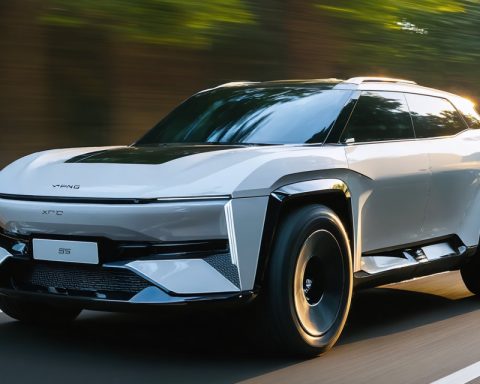- Tesla faces significant challenges, with its stock dropping around 35% since the inauguration of President Donald Trump.
- CEO Elon Musk’s involvement in the Department of Government Efficiency (DOGE) and his controversial image have raised investor concerns.
- Vandalism against Tesla vehicles and political involvement are influencing public perception and investor sentiment.
- Politicians, including Representatives from both parties, are buying Tesla shares, seeing potential in its current undervaluation.
- Inside Tesla, there are rising concerns about Musk’s leadership, with shareholder Ross Gerber criticizing the board’s passivity.
- The company’s reliance on government subsidies questions its true market value.
- Tesla’s future remains uncertain as it navigates political and financial challenges, redefining its role in the intersection of technology and politics.
In the high-stakes game of electric cars, Tesla electrified the roadways with its sleek designs and cutting-edge technology. But lately, as the world steers into political turmoil, the company that once navigated with precision finds itself struggling to regain its footing. Tesla’s stock has skidded dramatically since the inauguration of President Donald Trump— a staggering drop of around 35 percent. This financial freefall is not only making headlines but also turning heads in financial circles worldwide.
Beneath the shadow of Washington, Tesla’s trajectory veered into unexpected territory. The detour was fueled in part by CEO Elon Musk’s role at the heart of the newly minted Department of Government Efficiency (DOGE). His political entanglement and polarizing persona have sparked both curiosity and concern, leading investors and car enthusiasts to rethink their relationship with the brand.
Photographs from Pleasanton, California reveal a Tesla dealership, its facade shimmering under the July sun—a visual paradox to the turbulence beneath the surface. The company, which once seemed indomitable, faces a pivotal moment. Recent acts of vandalism against Tesla vehicles paint a picture of brand vulnerability and shifting public sentiment.
Financial disclosures reveal a twist in this unfolding saga: politicians are gravitating towards the beleaguered stock, spotting potential where others see only pitfalls. Notably, Democratic Representatives Julie Johnson, Josh Gottheimer, and Gilbert Cisneros, along with Republican Representative Marjorie Taylor Greene, have strategically purchased shares as the stock price hovers at tempting lows.
Inside the Tesla boardroom, dissent brews. Concerns mount over Musk’s leadership, with prominent investors questioning the board’s inertia as the brand’s value erodes. Ross Gerber, a significant shareholder, openly criticizes the board’s perceived complacency, urging more robust governance.
The economic narrative deepens with insights from finance expert Kevin Thompson and financial literacy instructor Alex Beene. The selloff, many argue, is catalyzed by Musk’s political alliances and his public demeanor. Yet these very actions create a dichotomy—while some investors flee, others see a silver lining, anticipating a rebound bolstered by Musk’s ties to the government.
However, as Tesla speeds into an uncertain future, there’s an undeniable tension. Taxpayer subsidies still prop up a significant portion of its valuation. For those eyeing a dip-buying opportunity, the overarching question remains: What is Tesla truly worth without government support?
Tesla’s story is far from over. It’s a narrative woven with innovation and intrigue, controversy and contradiction. Whether it’s a cautionary tale or a harbinger of resurgence, time will tell if this industry giant can navigate its current challenges to reclaim its former glory. Amidst these market tremors, one thing is clear: Tesla is redefining what it means to be at the crossroads of technology and politics.
Tesla’s Tumultuous Path: Political Ties, Stock Dips, and the Road Ahead
Tesla’s Dynamics: Understanding the Impact of Politics and Market Volatility
Tesla, a beacon of innovation in the electric vehicle (EV) industry, faces a confluence of challenges that have significantly impacted its positioning in the market. While the slick design and advanced technology of Tesla cars revolutionized personal transportation, the evolving political landscape and CEO Elon Musk’s contentious involvement in politics have added layers of complexity.
How Political Tides Affect Tesla’s Stock Performance
1. Political Engagements and Corporate Impact:
Elon Musk’s involvement in the Department of Government Efficiency (DOGE) has stirred varied reactions. His political entanglements, coupled with his often contentious public demeanor, have added to investor hesitancy. Experts like Kevin Thompson suggest that Musk’s dual roles as an innovative leader and a political figure create a unique perception of risk, with potential positive and negative implications.
2. Investors’ Response:
Despite the decline, some politicians, such as Democratic Representatives and notable Republicans, have invested in Tesla, recognizing the potential for future gains as the stock price remains attractive. This implies a confident outlook in Tesla’s strategic adjustments or technological advancements that may offset the political turmoil.
Real-World Implications and Considerations
1. Effects of Market Dynamics on EV Industry:
Elon’s Musk leadership style and the subsequent stock volatility pose broader questions around the sustainability and independence of innovative companies like Tesla in a politically charged environment. The company’s reliance on government subsidies further complicates the valuation question. Without such support, how would Tesla’s intrinsic value stand?
2. The Role of Subsidies:
Government subsidies crucially influence Tesla’s financial standing. As policymakers evaluate the landscape of sustainable transportation, the potential changes in subsidy allocations could profoundly impact the company’s trajectory and investor sentiment.
Industry Trends and Predictions
– Rise of Competitors: As Tesla grapples with these issues, competitors in the EV space are advancing rapidly. Companies like Rivian and Lucid Motors are positioning themselves as viable alternatives, placing competitive pressure on Tesla to maintain its market share.
– Innovations and Future Viability: Innovations in battery technology, self-driving capabilities, and sustainable manufacturing are areas where Tesla’s expertise might usher in a new era of growth, balancing present setbacks.
Advantages and Limitations of Tesla’s Outlook
Pros:
– Leadership in technological innovation.
– Strong brand identity and consumer interest.
– Politician-backed investment sees future potential.
Cons:
– Political affiliations causing stock volatility.
– Over-dependence on government subsidies.
– Challenges in maintaining board-level confidence.
Actionable Recommendations and Tips
For potential investors and current shareholders:
– Diversify Investments: Given the market uncertainties, diversify your EV portfolio to mitigate risks associated with Tesla’s current volatility.
– Stay Informed: Follow industry news and political developments to gauge potential impacts on stock performance.
– Assess Innovation Pipelines: Consider developments in Tesla’s technological pipeline as a key factor in investment decisions.
For Tesla owners and enthusiasts:
– Stay Updated on Incentives: Keep track of changes in government policies that may affect vehicle pricing and subsidies.
– Evaluate Insurance Options: Given the noted instances of vandalism, ensure comprehensive insurance coverage for added protection.
As Tesla navigates these turbulent waters, one certainty remains: its journey at the intersection of technology and politics is one of the most closely watched in the modern business narrative. Only time will reveal if this pioneering company will overcome its challenges or chart a new, unexpected course.














